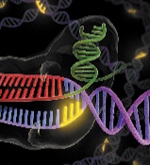문헌자료
| ㆍ 제목 | CRISPR, the disruptor | ||||||||||
|---|---|---|---|---|---|---|---|---|---|---|---|
| ㆍ 조회수 | 1284 | ㆍ 등록일시 | 2016-12-28 04:59:32 | ||||||||
| ㆍ 작성자 | 관리자 | ||||||||||
| ㆍ 첨부파일 | |||||||||||
|
Three years ago, Bruce Conklin came across a method that made him change the course of his lab. Conklin, a geneticist at the Gladstone Institutes in San Francisco, California, had been trying to work out how variations in DNA affect various human diseases, but his tools were cumbersome. When he worked with cells from patients, it was hard to know which sequences were important for disease and which were just background noise. And engineering a mutation into cells was expensive and laborious work. “It was a student's entire thesis to change one gene,” he says.  Nature special: CRISPR Then, in 2012, he read about a newly published technique1 called CRISPR that would allow researchers to quickly change the DNA of nearly any organism — including humans. Soon after, Conklin abandoned his previous approach to modelling disease and adopted this new one. His lab is now feverishly altering genes associated with various heart conditions. “CRISPR is turning everything on its head,” he says. The sentiment is widely shared: CRISPR is causing a major upheaval in biomedical research. Unlike other gene-editing methods, it is cheap, quick and easy to use, and it has swept through labs around the world as a result. Researchers hope to use it to adjust human genes to eliminate diseases, create hardier plants, wipe out pathogens and much more besides. “I've seen two huge developments since I've been in science: CRISPR and PCR,” says John Schimenti, a geneticist at Cornell University in Ithaca, New York. Like PCR, the gene-amplification method that revolutionized genetic engineering after its invention in 1985, “CRISPR is impacting the life sciences in so many ways,” he says. ... |
|||||||||||
| ㆍ 이전글 | 치료 목적의 유전자 편집: 앞으로의 전망과 해결해야 할 과제들 Therapeutic genome editing: prospects and challenges |
|---|---|
| ㆍ 다음글 | 정밀의료(유전체 연구) 관련 동향 및 전망 |






